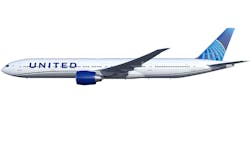Boeing, P&W Join NTSB Probe of Engine Failure
Boeing Co. and Pratt & Whitney are coopering with the National Transportation Safety Board in its investigation of an engine failure aboard a United Airlines flight that endured an engine failure after takeoff from Denver International Airport, Saturday, February 20. The 777-200 was headed for Honolulu when one of two PW4000 engines failed, catching fire and then breaking into pieces.
The flight returned to Denver and landed safely, with no injuries. Parts of the engine were scattered across areas of Colorado covered by the brief flight, including some residential areas.
According to a NTSB preliminary review, two fan blades in the engine fractured and others show signs of damage. Such internal ruptures usually are contained within the engine cowling, though part of that component also was lost in the incident.
The 777 is twin-engine, wide-body aircraft in commercial service since 1995. The PW4000 is a high-bypass turbofan engine widely used for wide-body aircraft, including Boeing’s 747, 767, and 777 (as well as the corresponding military transport, KC-46) and Airbus A300 jets.
Boeing recommended airlines suspend operations of its 777 aircraft powered by Pratt & Whitney 4000-112 engines until the FAA identifies the appropriate inspection protocol. It noted there are 69 such jets in service, and another 59 now in storage.
Such a suspension was mandated by the Federal Aviation Administration and the Japan Civil Aviation Bureau. “We are working with these regulators as they take actions while these planes are on the ground and further inspections are conducted by Pratt & Whitney,” Boeing added, in a statement.
The engine builder reported it dispatched a team to work with investigators, and added that it is “coordinating with operators and regulators to support the revised inspection interval of the Pratt & Whitney PW4000 engines that power Boeing 777 aircraft.”
News reports have linked the incident to an engine failure aboard a Japan Airlines 777-200 aircraft in December 2020, and to one aboard another United Airlines 777 in February 2018. Those incidents led to Japanese and FAA directives to increase inspections of the jets and the fan blades of PW4000 engines.
